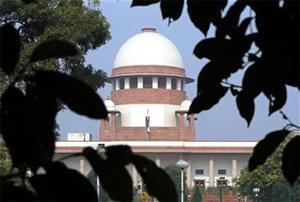 New Delhi, Nov 12: An allegation of sexual assault has hit the Supreme Court with a young woman intern accusing a sitting judge, who retired recently, of misbehaving with her in a hotel room last December when the nation was grappling with the gangrape of a woman in the capital.
New Delhi, Nov 12: An allegation of sexual assault has hit the Supreme Court with a young woman intern accusing a sitting judge, who retired recently, of misbehaving with her in a hotel room last December when the nation was grappling with the gangrape of a woman in the capital.
The allegation, levelled by the young woman lawyer against an unnamed judge, was raised in the apex court before the Chief Justice with a plea that the issue be taken note of suo motu on the basis of media reports and an inquiry be initiated.
A three-judge bench headed by Chief Justice P Sathasivam, before whom the matter was brought up by advocate M L Sharma, said "We are conscious of the fact."
The bench refused to pass any order when Sharma said that the matter is very serious and as the head of Indian judiciary, the CJI, should initiate inquiry on the allegation.
The woman, who graduated from National University of Juridical Sciences (NUJS) Kolkata this year and a fellow with an organisation, Natural Justice: Lawyers for Communities and the Environment, wrote about the alleged sexual harassment incident in a blog.
In the blog written on November 6 for Journal of Indian Law and Society, the lawyer said the incident took place last year when she was interning with the apex court judge.
"Last December was momentous for the feminist movement in the country – almost an entire population seemed to rise up spontaneously against the violence on women, and the injustices of a seemingly apathetic government. In the strange irony of situations that our world is replete with, the protests were the backdrop of my own experience.
"In Delhi at that time, interning during the winter vacations of my final year in University, I dodged police barricades and fatigue to go to the assistance of a highly reputed, recently retired Supreme Court judge whom I was working under during my penultimate semester.
"For my supposed diligence, I was rewarded with sexual assault (not physically injurious, but nevertheless violating) from a man old enough to be my grandfather. I won't go into the gory details, but suffice it to say that long after I'd left the room, the memory remained, in fact, still remains, with me," she said in the blog.
The law graduate, also in an interview to a website, said she was harassed by the judge in a hotel room and there were no other witnesses of the incident.
"It was a hotel room, (people) saw me walking in voluntarily, saw me walking out very calmly. I didn't even walk out (with) fear. At that moment I felt I needed to walk out very calmly. I never mentioned anything the same day to anybody," she said while speaking to 'Legally India'.
The woman, who did not mention the date of incident in her blog, has said in the interview with the website that it took place on December 24 last year.
"All the talk during that time was of stricter punishment, of baying for the blood of creepy men. Five years of law school had taught me to look to the law for all solutions–even where I knew that the law was hopelessly inadequate–and my reluctance to wage a legal battle against the judge left me feeling cowardly. On reflection though, I cannot help but wonder why I should have felt that way.
"As mentioned earlier, I bore, and still bear, no real ill-will towards the man, and had no desire to put his life's work and reputation in question. On the other hand, I felt I had a responsibility to ensure that other young girls were not put in a similar situation. But I have been unable to find a solution that allows that," the blog reads.
She also said despite the heated public debates, a vast army of feminist vigilantes, new criminal laws and sexual harassment laws, she has not found closure.
In the interview, she said, "I have heard of three other cases (of sexual harassment) by the same judge and I know of at least four other girls who have faced harassment from other judges not perhaps as (bad as mine): most of them were in the chambers of the judge and other people around, so it never gets too bad.
"A girl I know faced continuous sexual harassment throughout and sexual advances,and actually faced troubles through her work because of it."
At the end, the woman put a question that when dealing with sexual violence, can "we allow ourselves to embrace feelings beyond or besides anger, and to accept the complexity of emotions that we face when dealing with any traumatic experience?"
On why she came out with the revelation almost after a year, she said in the blog that while the incident affected her deeply, she felt "little anger and almost no rancour towards the man". Instead she was shocked and hurt that a person whom she respected much would do something like this.
"My strongest reaction really, was overwhelming sadness. But this sort of response was new to me. That I could understand his actions and forgive him for them, or that I could continue to think of him as an essentially good person, seemed a naive position that were completely at odds with what I had come to accept was the right reaction to such incidents," she said.





Comments
Add new comment